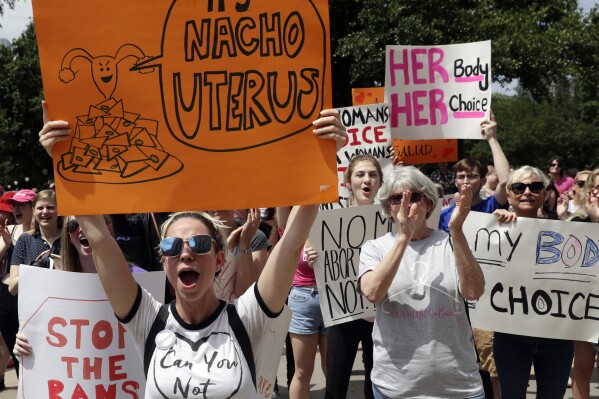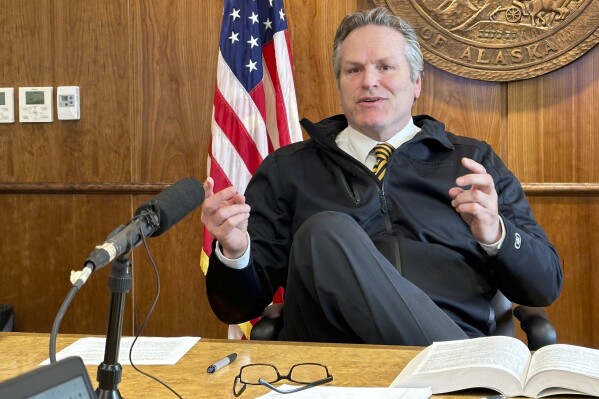Condoms aren’t a fact of life for young Americans. They’re an afterthought
AS IT ALWAYS HAS BEENSAFE SEX-
FORTY FOUR YEARS AFTER AIDS
Fewer young people are having sex, and the teens and young adults who are sexually active aren’t using condoms as regularly. It has some public health experts thinking about how to help young people have safe sex.

Condoms and other sexual wellness items are made available to students at the University of Mississippi campus in Oxford, Miss., Wednesday, Aug. 28, 2024. (AP Photo/Karen Pulfer Focht)
OXFORD, Miss. (AP) — It’s hard to miss the overflowing bowl of condoms at the entrance of the gym.
Some University of Mississippi students walking past after their workout snicker and point, and the few who step forward to consider grabbing a condom rethink it when their friends catch up, laughter trailing behind them. Almost no one actually reaches in to take one.
Though officials say they refill the bowl multiple times a day, and condoms are available at multiple places on campus, Ole Miss students say the disinterest is indicative of changing attitudes.

More women had their tubes tied after Roe v. Wade was overturned

Alaska governor vetoes expanded birth control access as a judge strikes down abortion limits
Fewer young people are having sex, but the teens and young adults who are sexually active aren’t using condoms as regularly, if at all. And people ages 15 to 24 made up half of new chlamydia, gonorrhea and syphilis cases in 2022.
The downward trend in condom usage is due to a few things: medical advancements like long-term birth control options and drugs that prevent sexually transmitted infections; a fading fear of contracting HIV; and widely varying degrees of sex education in high schools.
Is this the end of condoms? Not exactly. But it does have some public health experts thinking about how to help younger generations have safe sex, be aware of their options — condoms included — and get tested for STIs regularly.
“Old condom ads were meant to scare you, and all of us were scared for the longest time,” said Dr. Joseph Cherabie, medical director of the St. Louis HIV Prevention Training Center. “Now we’re trying to move away from that and focus more on what works for you.”
OXFORD, Miss. (AP) — It’s hard to miss the overflowing bowl of condoms at the entrance of the gym.
Some University of Mississippi students walking past after their workout snicker and point, and the few who step forward to consider grabbing a condom rethink it when their friends catch up, laughter trailing behind them. Almost no one actually reaches in to take one.
Though officials say they refill the bowl multiple times a day, and condoms are available at multiple places on campus, Ole Miss students say the disinterest is indicative of changing attitudes.
More women had their tubes tied after Roe v. Wade was overturned
Alaska governor vetoes expanded birth control access as a judge strikes down abortion limits
Fewer young people are having sex, but the teens and young adults who are sexually active aren’t using condoms as regularly, if at all. And people ages 15 to 24 made up half of new chlamydia, gonorrhea and syphilis cases in 2022.
The downward trend in condom usage is due to a few things: medical advancements like long-term birth control options and drugs that prevent sexually transmitted infections; a fading fear of contracting HIV; and widely varying degrees of sex education in high schools.
Is this the end of condoms? Not exactly. But it does have some public health experts thinking about how to help younger generations have safe sex, be aware of their options — condoms included — and get tested for STIs regularly.
“Old condom ads were meant to scare you, and all of us were scared for the longest time,” said Dr. Joseph Cherabie, medical director of the St. Louis HIV Prevention Training Center. “Now we’re trying to move away from that and focus more on what works for you.”
Drink protector “condoms” and other sexual wellness items are made available to students at the University of Mississippi campus in Oxford, Miss., Wednesday, Aug. 28, 2024. (AP Photo/Karen Pulfer Focht)
A shift in attitudes
Downtown Oxford was thrumming the day before the first football game of the season. The fall semester had just started.
Lines of college students with tequila-soda breath waited to be let in dim bars with loud music. Hands wandered, drifting into back pockets of jeans, and they leaned on one another.
It’s likely that many of those students didn’t use a condom, said Magan Perry, president of the college’s Public Health Student Association.
Advertisement
“Using a condom is just a big, ‘uh, no,’” the senior said.
Young women often have to initiate using condoms with men, she said, adding that she’s heard of men who tell a sexual partner they’ll just buy emergency contraception the next day instead.
“I’ve had friends who go home with a guy and say they’re not having sex unless they use a condom, and immediately the reaction is either a reluctant, ‘OK, fine,’ or ‘If you don’t trust me, then I shouldn’t even be here,’” Perry said. “They’re like, ‘Well, I’m not dirty, so why would I use them?’”
Women have long had the onus of preventing pregnancy or STIs, Cherabie said, and buying condoms or emergency contraceptives — which are often in a locked cabinet or behind a counter — can be an uncomfortable experience and “inserts a certain amount of shame.”
Annie Loomis, 25, a student at the University of Washington, said dating apps and casual sex are making it hard for people to know what a “healthy sexual relationship” looks like when it comes to intimacy and respect.
“If you say, ‘Hey, I want you to wear a condom’ and they say, ‘no, I don’t,’ you’re not having sex. It should be that simple,” Loomis said. “But it’s not.”
If pregnancy risk has been the driving factor for condom usage among heterosexual couples, the fear of contracting HIV was the motivation for condom use among men who have sex with men.
But as that fear has subsided, so has condom use, according to a recent study that focused on a population of HIV-negative men who have sex with men.
Grindr, a popular gay dating app, even lists condom use under “kinks” instead of “health.” Things like that make Steven Goodreau, an HIV expert at the University of Washington who led the study, worry that the change in attitudes toward condoms is trickling down to younger generations.
Goodreau believes the promotion of pre-exposure prophylaxis (PrEP), a drug that prevents HIV, is overshadowing condoms as a prevention strategy. A strategic plan for federal HIV research through 2025 doesn’t mention condoms, and neither does the national Ending the HIV Epidemic plan.
Students walk around the University of Mississippi campus in Oxford, Miss., Wednesday, Aug. 28, 2024. (AP Photo/Karen Pulfer Focht)
The Centers for Disease Control and Prevention acknowledges that condoms are still an effective tool that can be used “alongside newer prevention strategies.”
“We know that condom use has declined among some groups, but they still have an important role to play in STI prevention,” said Dr. Bradley Stoner, director of the CDC’s Division of STD Prevention. “Condoms can be accessed without navigating the health care system, can be used on-demand, are generally affordable and most importantly – they are effective at preventing HIV and STIs when used consistently and correctly.”
Medical advances allow for more options
Pleasure — for both men and women — has long been an undeniable factor for the lack of condom use, according to Dr. Cynthia Graham, a member of the Kinsey Institute team that studies condoms.
But more so, advances in medicine have expanded the options for both STI and pregnancy prevention.
Young cisgender women have been turning to contraceptive implants like intrauterine devices and birth control pills to keep from getting pregnant. And researchers say that once women are in committed relationships or have one sexual partner for a significant amount of time, they often switch to longer-term birth control methods.
Ole Miss junior Madeline Webb said she and her partner seem like outliers — they have been seeing each other for four years, but still use condoms. They also share the responsibility of buying condoms.
“People see condoms as an inconvenience … but they do serve a purpose even if you’re on birth control because there is always a chance of an STD,” Webb said.
A new drug on the market could mean even more STI prevention options for men and possibly women.
Doxycycline post-exposure prophylaxis, or doxy PEP, can be taken within 72 hours after unprotected sex and can help prevent chlamydia, gonorrhea and syphilis. It has to be prescribed by a doctor. Trials are still being conducted for women, but the drug is gaining traction among men who have sex with men and transgender women.
With widespread uptake, the drug has the potential to make a significant impact in STI prevention strategies.
“When PrEP came out, everyone was excited because it was one less thing to worry about in terms of HIV acquisition,” Cherabie said. “With another thing on board that can help decrease our likelihood of getting other STIs, on top of not having to worry about HIV, it gives our community and patients a little less anxiety about their sex lives.”
And in just a decade, PrEP has become a main preventive measure against HIV and other STIs for men who have sex with men – though it is disproportionately used by white men.
Condom use now is “pretty much a thing of the past” for men who have sex with men compared to the 1980s and early 1990s during the AIDS epidemic, said Andres Acosta Ardilla, a community outreach director at an Orlando-based nonprofit primary care clinic that focuses on Latinos with HIV.
“Part of what we have to talk about is that there is something enticing about having condomless sex,” Acosta Ardilla said. “And we have to, as people who are working in public health, plan for the fact that people will choose to have condomless sex.”
Condoms and other sexual wellness items are stored at the University of Mississippi campus in Oxford, Miss., Wednesday, Aug. 28, 2024. (AP Photo/Karen Pulfer Focht)
The fight over sex ed
Despite the relentless Southern sun, a handful of people representing various student organizations sat at tables in the heart of Ole Miss’ campus. Students walked past and grabbed buttons, wristbands and fidget toys. One table offered gold-packaged condoms – for cups to prevent drinks from being spiked.
Actual condoms are noticeably absent. They’re also absent in the state’s public schools.
Condom demonstrations are banned in Mississippi classrooms, and school districts can provide abstinence-only or “abstinence-plus” sexual education — both of which can involve discussing condoms and contraceptives.
Focus on the Family, a Christian organization that advocates for teaching abstinence until marriage, is concerned that comprehensive sex education “exposes students to explicit materials.” Abstinence-centered education is “age-appropriate” and keeps students safe and healthy, Focus on the Family analyst Jeff Johnston said in an emailed statement.
But Josh McCawley, deputy director of Teen Health Mississippi, an organization that works with youth to increase access to health resources, said the effects are clear.
“The obvious consequence is the rise of sexually transmitted infections, which is what we’re seeing right now, which can be a burden on the health care system,” he said, “but also there could be long-term consequences for young people in terms of thinking about what it means to be healthy and how to protect themselves, and that goes beyond a person’s sexual health.”
The latest CDC data from 2022 shows Mississippi has the highest teen birth rate in the country.
Scott Clements, who oversees health information for the state education department, was hesitant to criticize Mississippi’s sex education standards because they’re “legislatively mandated.”
“If the legislature wants to make changes to this, we will certainly follow their lead,” he added — though attempts to pass more advanced sexual education standards have died repeatedly in the Mississippi statehouse over the past eight years.
Nationally, there is no set standard for sex education, according to Michelle Slaybaugh, the director of social impact and strategic communication for the Sexuality Information and Education Council for the United States, which advocates for comprehensive sex ed.
Not every state mandates sex education. Some states emphasize abstinence. Less than half of states require information on contraception.
“There is no definitive way to describe what sex ed looks like from classroom to classroom, even in the same state, even in the same district,” Slaybaugh said, “because it will really be determined by who teaches it.”
Compare Mississippi to Oregon, which has extensive state standards that require all public school districts to teach medically accurate and comprehensive sexual education. Students in Portland are shown how to put on a condom on a wooden model of a penis starting in middle school and have access to free condoms at most high schools.
Lori Kuykendall of Dallas, who helped write abstinence-focused standards, said condom demonstrations like those in Portland “normalize sexual activity in a classroom full of young people who the majority of are not sexually active.” She also points to increasingly easy access to pornography — in which people typically do not wear condoms — is a contributing factor to the decline in condom use among young people.
Jenny Withycombe, the assistant director for health and physical education at Portland Public Schools, acknowledged the standards see pushback in the more conservative and rural parts of Oregon. But the idea is to prepare students for future interactions.
“Our job is to hopefully build the skills so that even if it’s been a while since the (condom) demo ... the person has the skills to go seek out that information, whether it’s from the health center or other reliable and reputable resources,” Withycombe said.
Those standards seem to contribute to a more progressive view of condoms and sex in young adults, said Gavin Leonard, a senior at Reed College in Portland and a former peer advocate for the school’s sexual health and relationship program.
Leonard, who grew up in Memphis – not far from Oxford, Mississippi, said his peers at Reed may not consistently use condoms, but, in his experience, better understand the consequences of not doing so. They know their options, and they know how to access them.
Slaybaugh wants that level of education for Mississippi students — and the rest of the country.
“We would never send a soldier into war without training or the resources they need to keep themselves safe,” she said. “We would not send them into a battle without a helmet or a bulletproof vest. So why is it OK for us to send young people off to college without the information that they need to protect themselves?”
This story has been corrected to show that Michelle Slaybaugh’s title is director of social impact and strategic communication for the Sexuality Information and Education Council for the United States.
___
Associated Press videojournalist Manuel Valdes in Seattle contributed to this report.
___
The Associated Press Health and Science Department receives support from the Robert Wood Johnson Foundation. The AP is solely responsible for all content.
SEX ED AT OLD MIS
A couple holds hands at the University of Mississippi campus in Oxford, Miss., Wednesday, Aug. 28, 2024. (AP Photo/Karen Pulfer Focht)
Condoms and other sexual wellness items are stored at the University of Mississippi campus in Oxford, Miss., Wednesday, Aug. 28, 2024. (AP Photo/Karen Pulfer Focht)
Condoms and other sexual wellness items are made available to students at the University of Mississippi campus in Oxford, Miss., Wednesday, Aug. 28, 2024. (AP Photo/Karen Pulfer Focht)

DEVNA BOSE
Bose is a public health reporter for The Associated Press, based in Jackson, Mississippi. She covers hospitals, rural health access and disparities, public health funding and other topics that broadly intersect with the health of communities.
twitter mailto












.jpg)
.jpg)